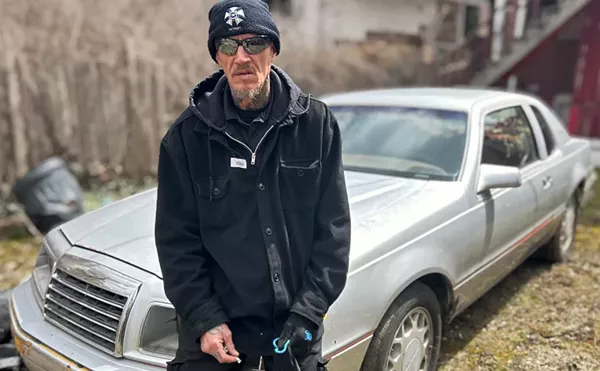
Audio By Carbonatix
[
{
"name": "GPT - Leaderboard - Inline - Content",
"component": "35519556",
"insertPoint": "5th",
"startingPoint": "3",
"requiredCountToDisplay": "3",
"maxInsertions": 100,
"adList": [
{
"adPreset": "LeaderboardInline"
}
]
}
]
The going-away party was held in a Bulgarian bar in Washington, D.C.’s Adams Morgan neighborhood. More than a dozen twentysomethings stood around a cramped space chatting; much of the conversation was about Iraq. At the center of attention was a guy with a slight frame to match his baby face and unruly brown hair. Every so often, someone would pull him away from his banter to pose for a photograph. More than one person — OK, everyone — made the same joke: “It’s as if we’re taking pictures in case you die.”
The party was for 23-year-old journalist David Enders, who was about to head back to Iraq where the Abu Ghraib prison scandal was breaking open and deadly conflicts between U.S. troops and Iraqis were escalating. But the bright-eyed journalist didn’t seem scared or worried — he had work to do back in Baghdad.
In May 2003, the Grand Rapids native and University of Michigan student and a couple of other young journalists headed into Iraq with no connections, no jobs, with nothing but bravado and their intellect and a desire to launch a newspaper that would tell the whole story of the people and the place in a time of American occupation. In June 2003, they launched Baghdad Bulletin, a biweekly paper with an online version.
During its heyday, the Bulletin cost 500 dinars (about 33¢) and was printed in English with a few pieces written in Arabic. The circulation was about 10,000. After seven issues, the money ran out and the Baghdad Bulletin closed in September.
Next spring, Enders will have a book published by the University of Michigan Press about his experiences. Tentatively titled Baghdad Bulletin, he describes it as a sort of “fear and loathing in Baghdad.” It’s about the adventures of a young American living under the American occupation of Iraq, and the successes and failures of the press in covering the conflict.
Since starting the paper, Enders has written for Slate and High Times and briefly became a celebrity in the international press, interviewed on NPR and elsewhere. More seasoned journalists can’t help but wonder what it is about this kid that spurred him to walk into the mouth of the tiger, to do what at some point all journalists wish they could do — cover a war.
For Enders it all started in 2003 in Lebanon, where he was an exchange student. He participated in anti-war protests in Beirut when the war broke out. People kept asking him, why is America doing this, and what's wrong with your press, why isn't the media telling the whole story?
Enders says he wanted to show with his newspaper and with his work that journalism can be better than it is, more in-depth, and than it can “actually contribute to alleviating the misunderstandings of both Iraqis and Americans.”
“I really wanted to show how methodology very much stilted what was being written in the American press. Instead of hunkering down in a fortified hotel, we embraced the city and the people,” Enders says. “Most journalists wait for a phone call to find out what’s going on in the city. We already knew because we were already there.”
For Enders, the human stories haven’t been hard to find, because he lives among Iraqis. He makes friends among them and says he’ll miss the people when he’s gone. He’s even been to the home of a mujahadeen.
Enders and his crew made the Iraqis’ problems their problems, including electricity and clean water shortages. But because he and his fellow Western reporters couldn’t know what it was like to be Iraqi, they hoped to eventually have local journalists writing for the paper.
They rented a house during the Bagdad Bulletin days, and since then Enders has stayed in apartments and hotels. While in Basra last year, he stayed with an Iraqi family for a time.
At times, for his safety, Enders wouldn’t tell people he was American — claiming instead he was Belgian or French. Translators he’s worked with have helped him with this subterfuge. He even pondered buying a black market passport.
Enders says what drove him into Iraq is what keeps him there. Certainly, there’s some ambition there for the young journalist, but anger and dissatisfaction with the status quo play a role, as does his personality. He says he’s unwilling “to believe anything I can’t verify on my own.”
“It’s sort of a problem. I was the kind of kid that didn’t believe the stove was dangerous until I got burned.”
He’s grabbing stories a lot of other journalists aren’t. Baghdad Bulletin may have folded, but writing assignments have come from magazines such as Men’s Journal and Mother Jones.
For High Times, Enders wrote about drug use in Baghdad, and magazine editor Annie Nocenti says he was one of the first to do so. His article spawned e-mails from soldiers talking about their marijuana experiences.
“He’s a natural storyteller. He finds the detail that’s interesting,” Nocenti says. “He’s just very personable so he hooks into a community.”
The Bulletin included features about the rebuilding of the country, Iraqi businessmen who feel left out of big contracts, the problem of getting electricity restored, and a piece about AIDS in Iraq.
“It was community journalism, essentially, but for a community that had suddenly become a worldwide nexus for so many issues,” Enders says.
Enders left Iraq on Aug. 7, and he’s now traveling to Palestine to complete another story for High Times. Already thinking about his next adventure, Enders may try to get to Afghanistan for that country’s elections and plans to return to Iraq for its scheduled January elections.
The journey
For a budding reporter, Enders has had a pretty good start on his career — he was a rising star as an English major with a political science minor at U-M, and has worked for The Michigan Daily, The Associated Press and The New York Times. In high school, he worked for The Grand Rapids Press.
He grew up the oldest of three, and says he always wanted to be a writer. As early as the third grade he wrote long stories about traveling around the world, perhaps influenced by the Indiana Jones films he loved. In the summer of 2002, Enders walked Eight Mile Road to write a story for The Associated Press. He wrote about a topless dancer, a palm reader and the owner of a blue-collar bar patronized by Chrysler workers. It was an effort to portray the people who lived and worked on the Detroit and suburban sides of the famous border, a street that for many symbolizes the divide between black and white in the area.
He started his Middle Eastern adventure in 2003. He was a U-M student looking to spend his last semester abroad.
Somewhat influential in his decision to travel to the Middle East, he says, was Detroit’s Rabih Haddad case. Haddad, an Ann Arbor Muslim leader and co-founder of the Global Relief Foundation charity, was arrested after the Sept. 11, 2001, attacks. Though the U.S. government publicly accused him of supporting terrorism, no charges were ever brought against Haddad (see “Haddad breaks his silence,” Metro Times, March 17). He was held in solitary confinement and jailed for 19 months, and eventually deported to Lebanon for overstaying his visa. Enders covered some of Haddad’s Detroit hearings as a freelancer for The New York Times.
“It became very clear then that we [Americans] had no real idea who the ‘threat’ is or how to deal with it,” Enders says. “I think the Middle East, for most Americans, is a big, scary, unidentifiable place, and since so much of [the] population seems to think that military force is the proper way to deal with the great unknown, maybe there should be more people here [in Iraq] trying to tell it like it is.”
Enders is of Lebanese ancestry; his maternal grandmother was born there, while his maternal grandfather was born in the United States to Syrian/Lebanese parents. In 2003, he was attending the American University in Beirut on a study program he created for himself. He planned to look up relatives while there, but he never got around to meeting them. The war began. He almost immediately began looking for a way to get into Iraq to cover it.
By spring break, he was applying for a human shield visa at the Iraqi embassy in Beirut. It was his way of getting into the country so he could take a shot at freelance war writing.
Take no prisoners
In the war zone, Enders has had many a brush with danger, including a run-in with a “very jumpy” member of the local militia who stuck a gun to Enders’ head, and Iraqi cops, who stole his money when he was out one night after curfew. Then there was the time he ended up in the middle of a Tikrit firefight with a Bradley tank machine gun pointed directly at him from six feet away.
“That was a bit disconcerting,” Enders says.
His typical day in Iraq? “Have a cup of coffee, listen for the morning car bomb,” Enders quips. “One of the guys I work with … made me put on record that I would not hold him responsible for my untimely death at the hands of a Sadr City funeral party before getting out of the car the other day.
“That’s as typical as anything.”
With such tales of near-death experiences, it might sound as though Enders is trying to be some kind of cowboy. But he says he’s got something else in mind, that most elusive thing that war correspondents from around the world search for: the story.
War is the quintessential story for a journalist. The journalist abroad during war gets to become another person, to live in strange places, to search out the story other journalists haven’t told and to chase developing news. It’s as close to understanding what life is like outside your own world as you’re ever going to get — and you know the whole world is watching.
It’s a thrill that has appealed to generations of journalists.
“The realization that one is to be hanged in the morning,” author Samuel Johnson once said, “concentrates the mind wonderfully.”
The experience of covering war can be “kind of a high,” says Elliott Parker, a Central Michigan University professor who worked as a freelance photographer for United Press International during Vietnam.
“Everything gets concentrated and yet it seems to be kind of in slow motion,” Parker says. “I’ve seen some film and tape of places I was … it just looks like total confusion at warp speed, but when you’re in the middle of it everything seems to kind of slow down.”
In a war, you’re not always sure who is friend or foe.
“You just don’t know what’s going to be happening. … You don’t want to call it exciting but you do want to say it’s a hell of an adrenaline rush,” says Charlotte Grimes, a former St. Louis Post-Dispatch reporter who covered the invasion of Panama in 1989.
“You’re on edge, your nerves are stretched, your senses are stretched … you take deadline rush and you magnify it by infinity,” says Grimes, currently the Knight Chair in Political Reporting at Syracuse University’s S.I. Newhouse School of Public Communications.
And death is a daily possibility.
“You’d be crazy if you didn’t think about it,” Grimes says. “On the other hand, you just have to take some deep breaths and hope that what you’re doing is not so stupid.”
Statistics vary on the number of journalists and media workers killed in Iraq. The International Federation of Journalists reports that at least 47 journalists and media staff have been killed in Iraq since the beginning of the war in March 2003.
Despite the risks, war “is life and death, it is politics, it is human nature, it is just blood, sweat and tears. It is great pain and an incredible high. It is just every story wrapped into one,” Grimes says. “Any reporter worth his or her salt wants to be part of that.”
Former NBC correspondent Phil Bremen, who covered a number of conflicts around the world, including Northern Ireland, Central America and the Middle East, describes it as a “quest for justice as well as action.”
“Most of the world’s wars are ugly, small-scale conflicts in little-known places,” says Bremen, who now teaches at Ball State University. “In many cases, the suffering and slaughter would go unnoticed by the outside world if reporters and photographers did not keep risking their lives to capture the story and convey it to the rest of us.”
When Enders was preparing to go into Iraq to start the newspaper, his mother says he told her, “Mom, what do I have to lose? If it folds, I’ll come home.”
“I was frightened,” says his mother, Denise Joseph. “I had some sleepless nights thinking he would come home in a body bag.”
Enders says before his first venture into the country, he spent the day feeling ill. From Jordan, he wrote in his Web log, dated May 1, 2003, “I’ve been trying to figure out if I should be terrified or not ... last night we were all sitting around the hotel here and people were talking about how they prepared themselves for death before going in and what an amazing experience that turned out to be in itself ... well, I have to admit I’m not particularly prepared to die, but if something should happen, it’s been a good run and I love you all.”
After he applied for the human shield visa, he wrote this for The Michigan Daily, the U-M newspaper, “After a quiet cab ride back to campus, one of my friends told me she’s worried I am ‘young and idealistic,’ and that she’s not sure about my ‘ability to assess risk.’ I told her I’m just more risk-acceptant than the average person.”
Enders says he probably wouldn’t have gone to Iraq if he hadn’t already been in Lebanon. He wouldn’t have seen it as a possibility. But in Beirut he had Iraqi friends and was growing increasingly more comfortable with his surroundings and fervent about the politics of the invasion.
“My feelings about the war were definitely made more acute — for the first time I had the feeling of being ‘the other.’ In Lebanon I was often asked to explain what ‘my country’ was doing. I also saw the anger of youth and of demonstrators in Lebanon — attacking the police, a greater willingness to rebel against social order,” he says.
“Rarely am I afraid,” he says. “Once you’ve accepted the notion you could be killed at random for no particular reason, fear becomes a bit irrelevant. Am I concerned when someone points a gun at my head and takes the safety off? Yes. Am I afraid? What’s the point? If he decides to fire, I’m not going to know the difference.”
Baghdad Bulletin is available online at baghdadbulletin.com.
Read some excerpts of David Enders' work:
David Enders reports from Baghdad.
Alexandra R. Moses is a freelance writer living in Washington, D.C. Send comments to letters@metrotimes.com





